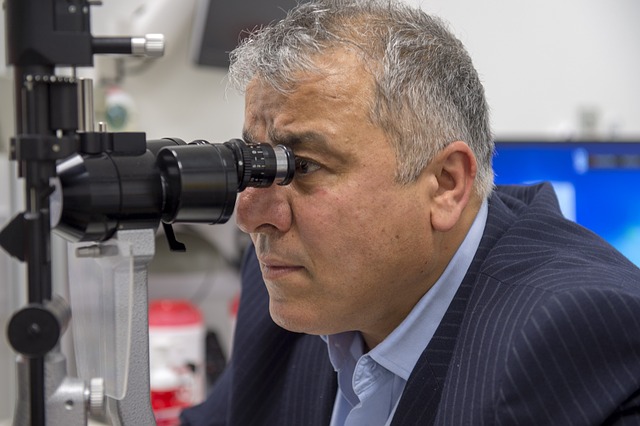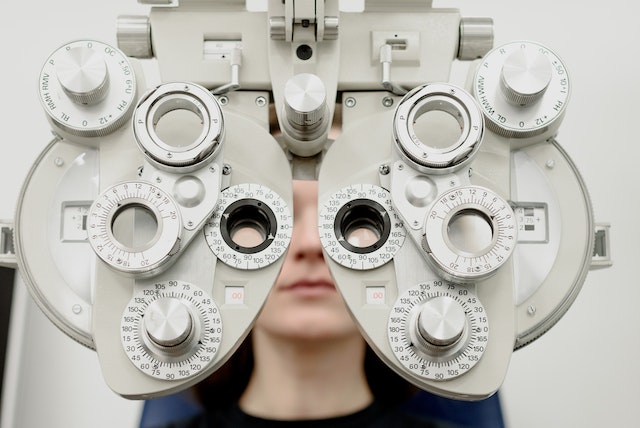Ophthalmology is the branch of medicine that deals with the diagnosis and treatment of eye diseases. Optometry is the branch of health care that deals with the examination and correction of vision.
Ophthalmology
(Image by CommsEditors101 from Pixabay )

Ophthalmology is the branch of medicine that deals with the diagnosis, treatment, and prevention of diseases and disorders of the eye and visual system. Ophthalmologists are medical doctors who specialize in the care and treatment of eye conditions and diseases, ranging from routine eye exams to complex surgical procedures.
Ophthalmologists use a range of techniques to diagnose and treat these and other eye conditions, including vision tests, eye exams, medications, and surgery. They also work closely with other medical professionals, such as optometrists and primary care physicians, to provide coordinated care for patients with eye-related health concerns.
Optometry
(Photo by Ksenia Chernaya)

Optometry is a branch of healthcare that deals with the examination, diagnosis, treatment, and management of disorders and diseases related to the eyes and vision system. Optometrists are primary eye care providers who specialize in assessing and managing various eye conditions and vision problems.
optometry plays an essential role in maintaining and improving the eye health and vision of patients. Optometrists are an important part of the healthcare team, and their work helps to prevent and manage a range of eye conditions and vision problems.
Ophthalmology Vs. Optometry – Key differences
Medical Training: Ophthalmologists are medical doctors who have completed four years of medical school and a residency in ophthalmology, which includes surgical training. Optometrists, on the other hand, complete a four-year doctoral program in optometry, which does not include surgical training.
Scope of Practice: Ophthalmologists have a broader scope of practice and are qualified to diagnose and treat a wide range of eye diseases and disorders, prescribe medications, perform surgical procedures, and manage eye-related medical conditions. Optometrists primarily provide routine eye exams, prescribe corrective lenses, and diagnose and manage some eye conditions, but they do not perform surgery.
Focus: Ophthalmologists focus on the medical and surgical treatment of eye diseases and conditions, including managing systemic diseases that affect the eyes. Optometrists focus on primary eye care, including prescribing corrective lenses, diagnosing and managing some eye conditions, and performing routine eye exams.
Licensing and Certification: Ophthalmologists are licensed medical doctors who are board-certified in ophthalmology. Optometrists are licensed optometrists who are board-certified in optometry.
Ophthalmology and optometry are complementary specialties that work together to provide comprehensive eye care to patients. Ophthalmologists generally provide more advanced medical and surgical care for eye diseases and conditions, while optometrists focus on primary eye care and prescribing corrective lenses.
Conditions that ophthalmologists treat
Refractive errors: These are vision problems that result from the shape of the eye, including nearsightedness, farsightedness, and astigmatism.
Cataracts: This is a condition in which the lens of the eye becomes cloudy, leading to blurred vision and eventual vision loss.
Glaucoma: This is a group of eye conditions that cause damage to the optic nerve and can lead to blindness if left untreated.
Age-related macular degeneration: This is a condition that affects the central vision and is most common in people over the age of 50.
Diabetic retinopathy: This is a complication of diabetes that can cause damage to the blood vessels in the retina and lead to vision loss.
Services provided by an Ophthalmologist
An ophthalmologist is a medical doctor who specializes in the diagnosis and treatment of eye diseases and disorders. They provide a wide range of services to address a variety of eye-related health issues, including:
Eye exams: Ophthalmologists perform comprehensive eye exams to evaluate vision and screen for eye diseases and other health conditions that may affect the eyes.
Prescription of corrective lenses: Ophthalmologists can prescribe and fit corrective lenses, such as eyeglasses and contact lenses, to help patients with vision problems.
Diagnosis and treatment of eye diseases: Ophthalmologists diagnose and treat various eye conditions, such as glaucoma, cataracts, and macular degeneration. They can also manage other conditions, such as dry eye syndrome, conjunctivitis, and allergies.
Refractive surgery: Ophthalmologists can perform surgical procedures to correct refractive errors, such as LASIK, PRK, and other types of laser vision correction.
Other eye surgeries: Ophthalmologists also perform surgical procedures for other eye conditions, such as cataracts, glaucoma, and retinal detachment.
Management of systemic conditions: Some systemic conditions, such as diabetes, can affect the eyes. Ophthalmologists work closely with other medical professionals to manage and treat these conditions.
Research and teaching: Ophthalmologists often engage in research and teaching to advance the field of ophthalmology and improve patient outcomes.
Services provided by an Optometrist
Vision testing: Optometrists perform comprehensive eye exams to evaluate vision and screen for eye diseases and other health conditions that may affect the eyes.
Prescription of corrective lenses: Optometrists prescribe and fit corrective lenses, such as eyeglasses and contact lenses, to help patients with vision problems.
Diagnosis and treatment of eye diseases: Optometrists diagnose and treat various eye conditions, such as glaucoma, cataracts, and macular degeneration. They can also manage other conditions, such as dry eye syndrome, conjunctivitis, and allergies.
Referral to other specialists: Optometrists work closely with other healthcare professionals, such as ophthalmologists and primary care physicians, to manage and treat more complex eye conditions.
Counseling and education: Optometrists provide patients with advice and education on maintaining good eye health, including proper nutrition, eye safety, and managing vision-related issues.
The Differences in training and education of a Ophthalmologist and Optometrist
Ophthalmology is the medical specialty that deals with the anatomy, physiology, and diseases of the eye. An ophthalmologist is a medical doctor (MD) who has completed four years of undergraduate education, four years of medical school, a one-year internship, and three years of residency training in ophthalmology.
Optometry is the health care profession that involves examining the eyes and providing vision correction. Optometrists are not medical doctors; they hold a doctor of optometry (OD) degree from an accredited optometry school. Most optometrists complete four years of undergraduate education followed by four years at an accredited optometry school.
When to see an Ophthalmologist Vs. Optometrist
If you have an emergency situation with your eyes, such as sudden vision loss, pain, or injury, you should see an ophthalmologist right away. If you have a chronic disease that affects your eyes, such as glaucoma or macular degeneration, you should also see an ophthalmologist for regular checkups and treatment.
If you need a routine eye exam or are interested in getting contact lenses or glasses, you can see either an optometrist or ophthalmologist. However, most people choose to see an optometrist for these types of services.









